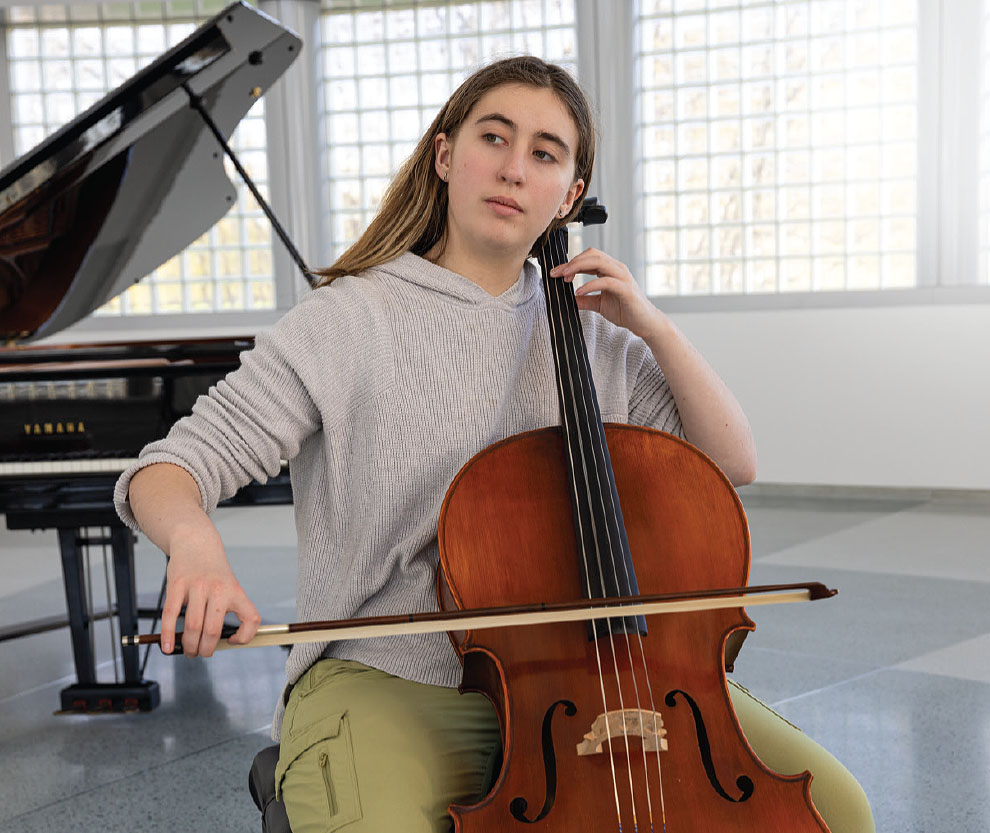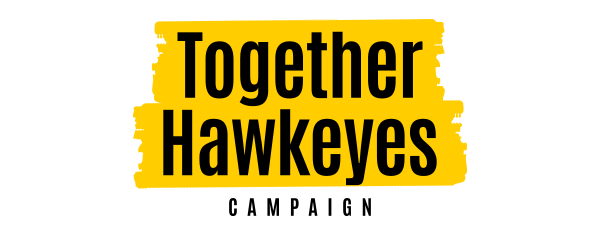Twice as Bright: Innovative Iowa Program Helps Neurodivergent Students Shine
Kate Cannon is at her best when buried deep in the belly of Voxman Music Building. This is where the third-year music therapy major spends most of her time: in the hallways, walking with friends; on stage, showcasing her talent as a pianist, cellist, and singer; and in classrooms, spending long hours studying. At Voxman, Cannon is in her element, and she is determined to use her passion for music to help others thrive too.
But it’s taken time and hard work to get here. “The only way to describe my freshman year is it was a little bit of an emotional roller coaster,” says Cannon, reflecting on the adjustment to college’s unfamiliar environments, relationship struggles, and demanding new course loads.
Cannon—an academically and musically advanced student who has anxiety, ADHD, and autism—was overwhelmed. With all the energy she devoted just to make it through each class her freshman year, the thought of being accepted into the music therapy program was a daunting one.
Cannon wasn’t about to give up, though. She embraced the challenge with the assistance of the University of Iowa’s Academy for Twice-Exceptionality, an innovative program designed to support students just like her. Taking advantage of the academy’s wide set of resources, she says, has made all the difference. Now, settled into the music therapy major, Cannon looks confidently toward the future.
The College Challenge
Twice-exceptional students like Cannon are both academically talented and have disabilities such as autism, ADHD, specific learning disorders, or anxiety and depression. Because their talents may hide their disabilities and their disabilities may hide their talents, these students often fall through the cracks of academic support. In college, where the support is typically less hands-on, receiving meaningful help to hone executive functioning, time management, and social skills can be especially challenging. But the UI is working to change that.
“What we want is to provide an environment where students feel welcomed, supported, and respected for the individual talents they bring”. —Megan Foley-Nicpon, director of the Belin-Blank Center
For years, faculty at the UI College of Education’s Belin-Blank Center and the Carver College of Medicine’s Iowa Neuroscience Institute have joined forces to better understand twice-exceptionality. Their research to find the causes of twice-exceptionality, identify useful tools and therapies for twice-exceptional students, and advocate for better accommodations in schools and workplaces laid the foundation for the Academy for Twice-Exceptionality.
Started as a pilot program in 2021, the academy aims to put Iowa’s vast bank of research into action to improve the college experience for the UI’s twice-exceptional students, especially those with autism. Though it has grown and changed significantly over the last three years, the social, emotional, and academic development of its students remains the academy’s core goal.
“Transitioning to college is hard for most students, and the University of Iowa is a big place,” says Megan Foley-Nicpon, professor of counseling psychology and director of the Belin-Blank Center, which oversees the academy. “So what we want is to make it smaller, to provide an environment where students feel welcomed, supported, and respected for the individual talents they bring.”
A Shared Community
Like other twice-exceptional students, Cannon didn’t always feel included in school. Growing up neurodivergent meant the classroom often seemed unaccommodating to her needs—and friends could also be impatient or inflexible. Still, by high school, Cannon’s musical gifts and deep empathy began to flourish.
“I did have some hardships in school, like some of the grading systems, a few fake friends, and stuff like that,” says Cannon. “But over time, those hardships helped me learn so many things about what’s really important: about relationships, having good friends, academics, and how I can overcome issues.”
At the end of her senior year at Iowa City West High School, Cannon was ready to leave those hardships behind and move forward, toward college and a career. That she would continue to pursue music, her lifelong passion, was nearly a given. But it was a mix of encouragement from teachers and friends, as well as her strong desire to help others, that led her to music therapy at Iowa.
Cannon knew the program was a perfect match. She just had to make it in.
Cannon and her mother were thrilled when they found a flyer for the fledgling Academy for Twice-Exceptionality. The program offered a rare opportunity for Cannon to receive tailored assistance for her transition to college that could prepare her to achieve her big dreams. More than that, it was a chance to meet people at school who understood her and shared her challenges. Cannon joined the academy during its pilot year as one of just two students.
 PHOTO: JASON SMITH
Kate Cannon, a gifted cellist and pianist, plans to become a music therapist.
PHOTO: JASON SMITH
Kate Cannon, a gifted cellist and pianist, plans to become a music therapist.
In the Driver’s Seat
Just like their peers at Iowa, Cannon and the other members of the Academy for Twice-Exceptionality—now up to 13—go to class, stress over exams, join teams and clubs, and hang out with friends. In the background, the academy works hard to boost student success in each area.
Each student meets weekly with Emily Kuhlmann (20MA), a PhD candidate in counseling psychology who studies the program’s effectiveness. Kuhlmann prefers taking the hands-on approach to her research; meeting face-to-face with students, she finds, is far more effective than just “crunching numbers.” This way, she is better able to understand the complexities of the program and see each member as an individual.
In return, she is a resource for the wide variety of needs the academy students may express week-to-week, from managing class schedules and homework, to finding rewarding extracurricular activities, to resolving social struggles. “Universities are not set up for students who are neurodiverse, and that’s a big challenge for them,” says Kuhlmann. “Part of my role is just helping them navigate all those different challenges.”
Kuhlmann—along with Randy Lange (89MA, 04PhD), Belin-Blank clinical professor and associate director for academic affairs—also runs a weekly seminar for the academy. Tailored to the group, topics vary from writing professional emails to navigating what it means to be twice-exceptional at school and work. Frequently, the seminar also connects students to other resources on campus, including Student Disability Services, Student Health, and University Counseling Service.
Outside the seminar, Lange believes that one of the most important elements of the academy is goal setting. He and Kuhlmann have each student develop three goals at a time, one in each category: academic, engagement (or social), and personal. Goals may be short-term, like turning in assignments on time for a particular course, or take a longer view.
One of Cannon’s academic goals was to be accepted into the music therapy program by acing the prerequisite classes. For her, that meant building new study skills and finding a comfortable, caring social circle that allowed her to focus on school. After three semesters of dedication, achieving it for her junior year meant celebration, relief, and time to choose a new goal.
The goals help students build awareness of both their strengths and challenges. They also give students control of how they achieve their dreams, especially important for twice-exceptional young adults, who may not always feel like they have agency in settings that do not accommodate them. “Students have done a great job coming up with a plan to progress through their goals and redirecting themselves when plan A and B don’t work,” says Lange. “I think it’s a great experience to be able to say that you’re in the driver’s seat. You’re in charge of where you’ll be tomorrow.”
Outside the classroom, the academy also is a social hub for twice-exceptional students. Friendships form in both official events, such as the annual Parents’ Weekend in the spring, and in student-organized hangouts. Movies, video games, and craft nights are some favorite social activities. “I think one thing that we do really well is provide a space where people in a room together have a similar experience,” says Lange. “Students have said to us that they enjoy being around other people who are like them and understand what it’s like to be someone with autism.”
The community isn’t just for students, either. Kristin Meyer Cannon (97BA, 05MA), Kate’s mom, is grateful that the academy keeps her informed on her daughter’s progress. While not intended to encourage “helicopter parents,” Lange and Kuhlmann do send updates every few weeks, so that each student can have their support systems at home and school on the same page. “They were very helpful in allowing me to gain insight on the things that she was struggling with in this transition,” says Kristin Cannon. “And if there were things I knew she was struggling with, I could communicate those back to her advisor.”
The variety of personalized resources that the Academy for Twice-Exceptionality offers is something Kate Cannon appreciates most about the program. “It can help you out in any way possible,” she says. “You can meet a lot of new people, a lot of new friends, and learn new techniques and ways to improve yourself in college. It changed me a lot.”
Everyone’s Welcome, Everyone Wins
Cannon isn’t the only one who feels that way. Kuhlmann, who began her clinical internship year at the American Family Children’s Hospital at the University of Wisconsin-Madison this summer, reflects on what the academy has given her. “As a future psychologist, that individualized support approach, rather than applying one thing to all people with a shared diagnosis, is definitely something that’s important to me to keep,” she says. “I’m proud and happy about that.”
Meanwhile, the Academy for Twice-Exceptionality has an eye on growth—to a certain degree. While both Lange and Foley-Nicpon are excited by the program’s rising enrollment, they don’t want that individualized approach to be compromised by large student numbers. Instead, they are focused on making the academy more effective for its members by building new opportunities, such as a potential partnership with the Pomerantz Career Center. Career resources are especially important to the academy because people with autism are unemployed at significantly higher rates than their neurotypical peers.
Lange also hopes to provide more specific support tailored to a student’s year in school. Those changes might include splitting the weekly seminar by grade level so that first-year students focus on their adjustment to college, while upperclassmen explore topics like career development and graduate programs.
Most importantly, Lange and Foley-Nicpon want to maintain the nurturing, uplifting network they’ve created. “There aren’t very many places where students who have these amazing academic talents alongside areas of growth can feel like they’re understood. I think sometimes that can feel really isolating,” says Foley-Nicpon. “And if we’re able to develop a community where students can feel proud, have self-efficacy, believe in themselves, and have the courage to pursue their dreams, then I think we’ve made a difference. And that feels really good.”
For her part, Cannon is happy with where she is and where she’s going. She’s had plenty of time to think about what she wants to do with music therapy after graduation, and her conclusion is hardly a surprise.
As always, Cannon is compelled to give back in a personal way. “The people I’m hoping to help out with music therapy are people with disabilities just like me,” she says. “I just want to give it my all and do my best.”

